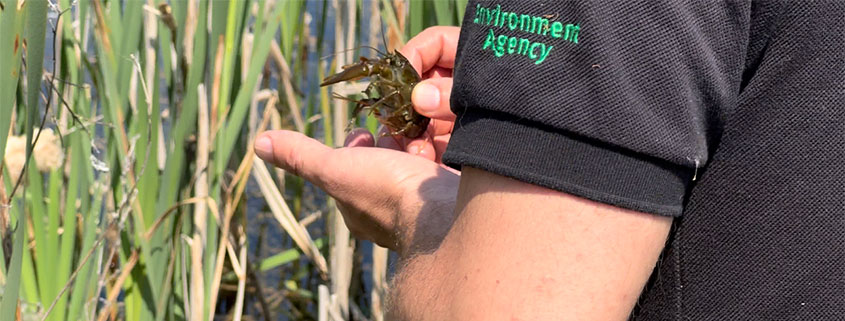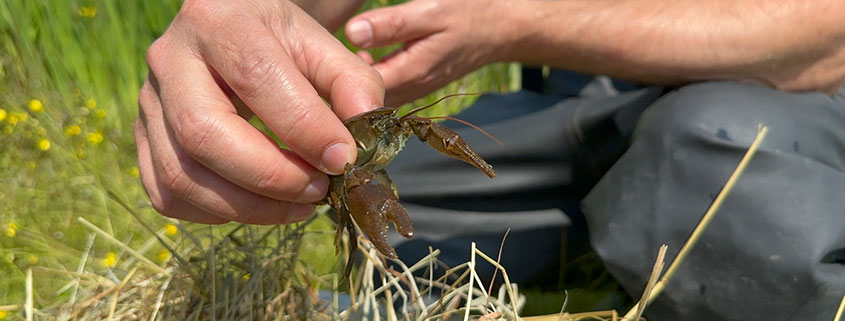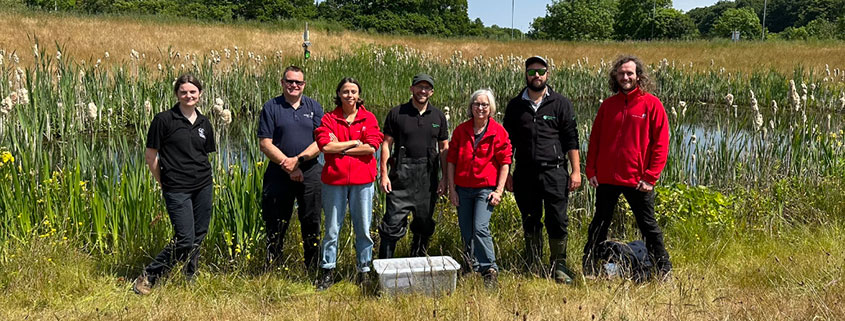Estates team help to find new home for endangered crayfish
Last updated on 3 July 2023
The Estates team working with the Environment Agency and colleagues in the Faculty of Biological Sciences have rescued endangered white clawed crayfish and moved them to a pond at Bodington Fields.
Last month, Environment Agency biodiversity specialists saved the population from Meanwood Beck in Leeds, where crayfish plague was detected during water sampling.
The rescued fish, which included females carrying eggs, were kept for safekeeping in quarantine at York Gate Garden and in labs at the University before passing health checks to ensure they were plague free.
Most have now been released into Bodington Pond where they can thrive and breed before being released back into the wild.

Working together to enhance biodiversity
The rescue and release is part of work by the Environment Agency and partners to carry out operations to rescue the native species after the invasive signal crayfish and a disease it carries – crayfish plague – moved through parts of the River Aire catchment.
James Wright, Senior Maintenance Manager in the Facilities Directorate, coordinated the move to Bodington Fields. He said:
“Our balancing pond at Bodington provides the crayfish with the environment they need and so this was a perfect opportunity for us to step in and help. It’s great to be able to be able to work together to expand the ‘Living Lab’ work at the University too.”
Ann Allen, Director of Campus Innovation & Development, University of Leeds said:
“Bodington Pond was originally constructed to reduce flood risk in the River Aire catchment, but it also enhances biodiversity and provides opportunities for students, academics and partners to collaborate on research projects.
“The Estates team have worked in partnership with the Environment Agency and colleagues across the University to welcome our brand new residents. It’s a wonderful example of how collaboration can make a real difference.”
Endangered crayfish play vital role
Environment Agency biodiversity specialist Tim Selway, who is leading the project, said:
“With so few populations of native crayfish remaining, we must act to preserve what we can.
“The endangered white-clawed crayfish plays a vital role in keeping our waterways clean and as a source of food for other native species, so it’s vital we take action to ensure its survival.
“Those rescued from Meanwood Beck are now on the next step of their journey and will be cared for at the university before going back into the wild in future. We’ll be carrying out further operations to rescue more crayfish from the deadly invasive signal and the disease it carries in the coming months.”
Rare white-clawed crayfish are the UK’s only native, freshwater crayfish, and are most at risk from signal crayfish, which spread plague and compete for food. They have struggled to survive after the more aggressive signal crayfish population has taken hold across the country.
How can you help?
The Agency and university is calling for people to play their part by making sure they “Check, Clean and Dry” to prevent the spread of invasive species.
Alison Dunn, Professor of Ecology at University of Leeds added:
“Invasive species and diseases are a growing challenge for native wildlife so it’s really important that everyone plays their part in reducing the risk.
“The good news is there are things you can do to help stop the spread if you’re near any rivers or lakes for recreation or work. Simple steps, such as checking, cleaning and drying your equipment and boots, makes a big difference to native species like the white-clawed crayfish.”
If you see crayfish or other species, leave them there. Do not move animals or plants to a new river or lake and do not use crayfish as angling bait as this could spread invasive species or diseases. Anything that has contact with the water and riverbank needs to be cleaned thoroughly, using hot water if possible. The use of an environmentally friendly aquatic disinfectant is also recommended. This will make sure all aquatic diseases and invasive species are killed. More information can be found on the Invasive non-native species website
If you see any crayfish, alive or dead, leave it where it is and report it immediately to the Environment Agency on 0800 807060. If possible, take close-up photos of the crayfish to help identify the species. It is illegal to handle or remove crayfish from the water without the correct licences.
To get more updates from Estates and Facilities, visit our news section here and follow us on Twitter at @uolcampusdevelopment.



